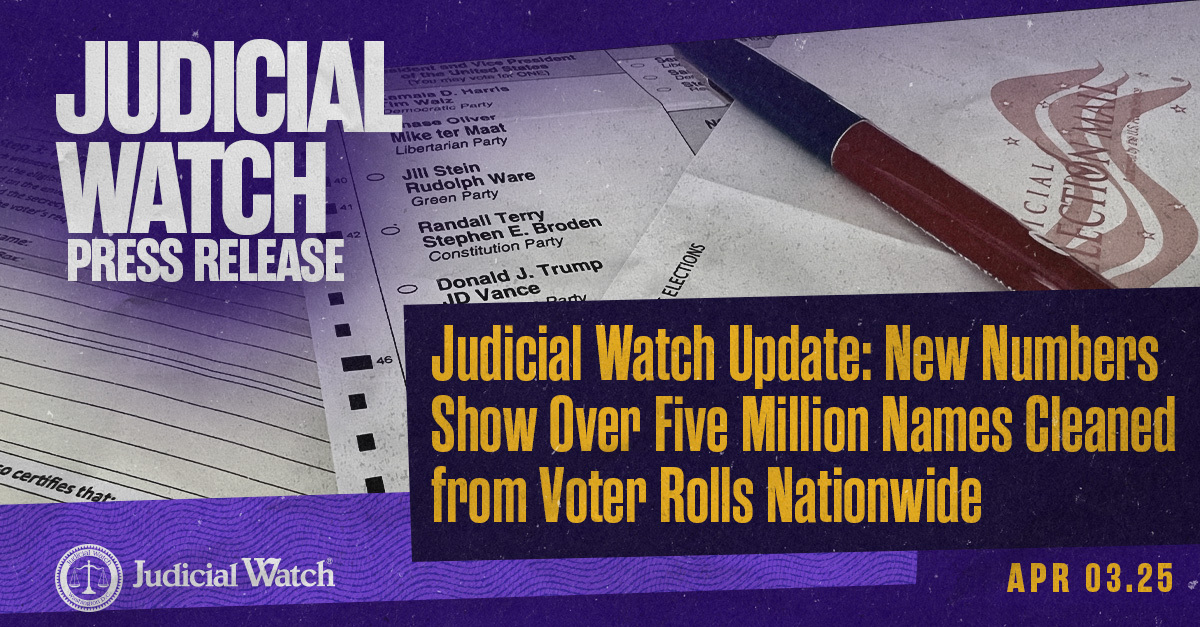
Federal Judge Orders Homeland Security to Produce “Preservation Requests” for Email Records for Secretary Jeh Johnson, Top DHS Officials

(Washington DC) – Judicial Watch announced that a federal court judge ordered the Department of Homeland Security (DHS) to produce this week any “preservation requests” for emails sent to Homeland Security Secretary Jeh Johnson, Deputy Secretary Alejandro Mayorkas, Chief of Staff Christian Marrone, and General Counsel Stevan Bunnell. The order from U.S District Court Judge Randolph Moss came in a Freedom of Information Act (FOIA) lawsuit seeking agency records in the personal email accounts used by the four top Homeland Security officials (Judicial Watch v U.S. Department of Homeland Security (No. 1:16-cv-00967)). The court order, issued last week after a hearing, requires DHS to comply by January 12 (Thursday).
At last week’s January 5 hearing, Obama Justice Department lawyers confirmed that nothing had been done to retrieve government records from Jeh Johnson or the other officials’ accounts. According to the hearing transcript:
THE COURT: But you say to me there’s no reason to doubt that the agency will pursue the records and that they’ll be returned, but it’s been six months. Is there any evidence that anything has been done to retrieve those documents or records?
[Justice Department Lawyer Bailey] HEAPS: I think that the six months though, your Honor, refers to the time in a FOIA request which is independent of any obligations under the Federal Records Act. And I don’t think we would be in this position with respect to the FOIA case had a valid request been filed or submitted.
THE COURT: But put that aside for a second. I mean, the government has been on notice at least since May though that there’s reason to believe that there are e-mails that are residing on individuals’ private servers that are government records, right?
HEAPS: Your Honor, the first thing I would point out — and I think it’s important because we’re going back and forth between FOIA and the Federal Records Act, is we don’t have reason to believe — or let me be clear, we don’t know that there are federal records that are in the personal e-mail accounts.
THE COURT: So has anyone checked to see if there are? Has anyone asked a question, anything to try and figure that out?
HEAPS: I can’t represent one way or the other to that, your Honor.
Judge Moss’s order, issued shortly after the hearing, reads in part:
On or before 1/12/2017, the Government is to produce, under seal, for in-camera submission, the preservation requests that it sent to all four of the individuals; The Government is also to file a notice on the public record, on or before 1/12/2017, regarding the in-camera filing, and to indicate the individuals intentions with respect to abiding by the preservation requests.
The January 5 hearing came in response to a Motion for Preservation Order filed by Judicial Watch . In that filing Judicial Watch asked the court to issue a “preservation order” for the non-.gov emails of Johnson, Mayorkas and Bunnell because their departure from government service is anticipated upon the installation of the new administration and Homeland Security will no longer have any control over these individuals:
The records at issue are in the physical possession of three current agency officials and one former agency official. With the upcoming change in administrations on January 20, 2017, it is likely that the three officials currently in office (Secretary Jeh Johnson, Deputy Secretary Alejandro Mayorkas, and General Counsel Stevan Bunnell) will leave government service.
Counsel for DHS has informed [Judicial Watch’s] counsel that DHS has “asked” these officials to preserve the agency records in their possession. DHS’ counsel declined to provide any evidence supporting this assertion. Because [Judicial Watch] does not know specifically what DHS asked its employees to do and what, if any, other steps DHS has taken to ensure preservation, Plaintiff is concerned DHS’s mere requests to its employees are insufficient. This will be particularly concerning once the officials possessing the emails leave government employment, as the agency will have no control over the actions of these officials.
***
A court order requiring preservation of these emails is particularly necessary now as DHS has suggested that these officials may have been acting without authorization by sending emails from these accounts…. As such, there is no assurance that these officials will abide by a “request” by the agency to preserve these emails, particularly after their employment ends.
An order requiring DHS to take steps to preserve the agency records at issue is consistent with an agency’s recordkeeping responsibilities to retain and manage government records subject to the Federal Records Act….If the agency officials are permitted to leave their employment while retaining agency records in their personal email accounts, it risks creating a situation comparable to that of former Secretary of State Hillary Clinton. In that instance, it is undisputed that only a portion of Secretary Clinton’s emails eventually were returned to the agency.
[Judicial Watch] respectfully requests expedited consideration of this motion in light of the likely imminent departure from government service of the three agency officials possessing agency records in their personal email accounts.
“The Obama gang is creating another email scandal with Jeh Johnson and the Department of Homeland Security,” said Judicial Watch President Tom Fitton. “We know there are likely government records on Jeh Johnson’s and other top DHS officials’ personal email accounts. That the Obama administration hasn’t lifted a finger to retrieve these public records is criminal.”
In June, Judicial Watch in a related case obtained 693 pages of Homeland Security records revealing that Secretary Jeh Johnson and 28 other agency officials used government computers to access personal web-based email accounts despite an agency-wide ban due to heightened security concerns. The documents also reveal that Homeland Security officials misled Rep. Scott Perry (R-PA) when Perry specifically asked whether personal accounts were being used for official government business.
The waivers were granted to Johnson and other senior staffers after Homeland Security’s Sensitive Systems Policy Directive 4300A was promulgated on April 30, 2014. The Directive was issued after hackers breached the Office of Personnel Management computer system. Directive 4300A states, “The use of Internet Webmail (Gmail, Yahoo, AOL) or other personal email accounts is not authorized over DHS furnished equipment or network connections.”
###
















